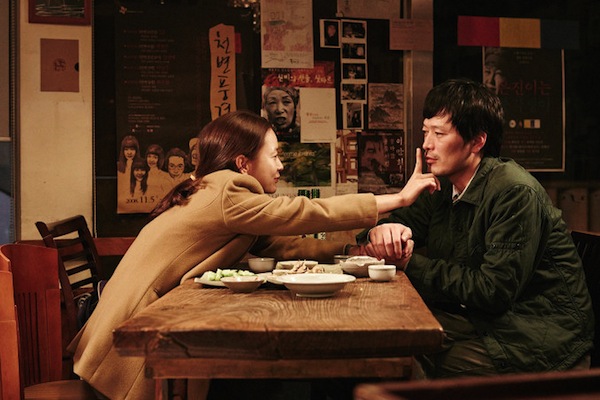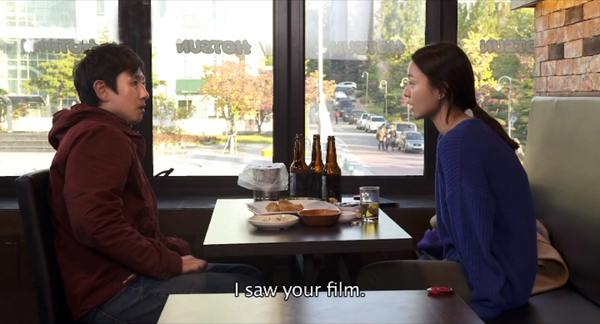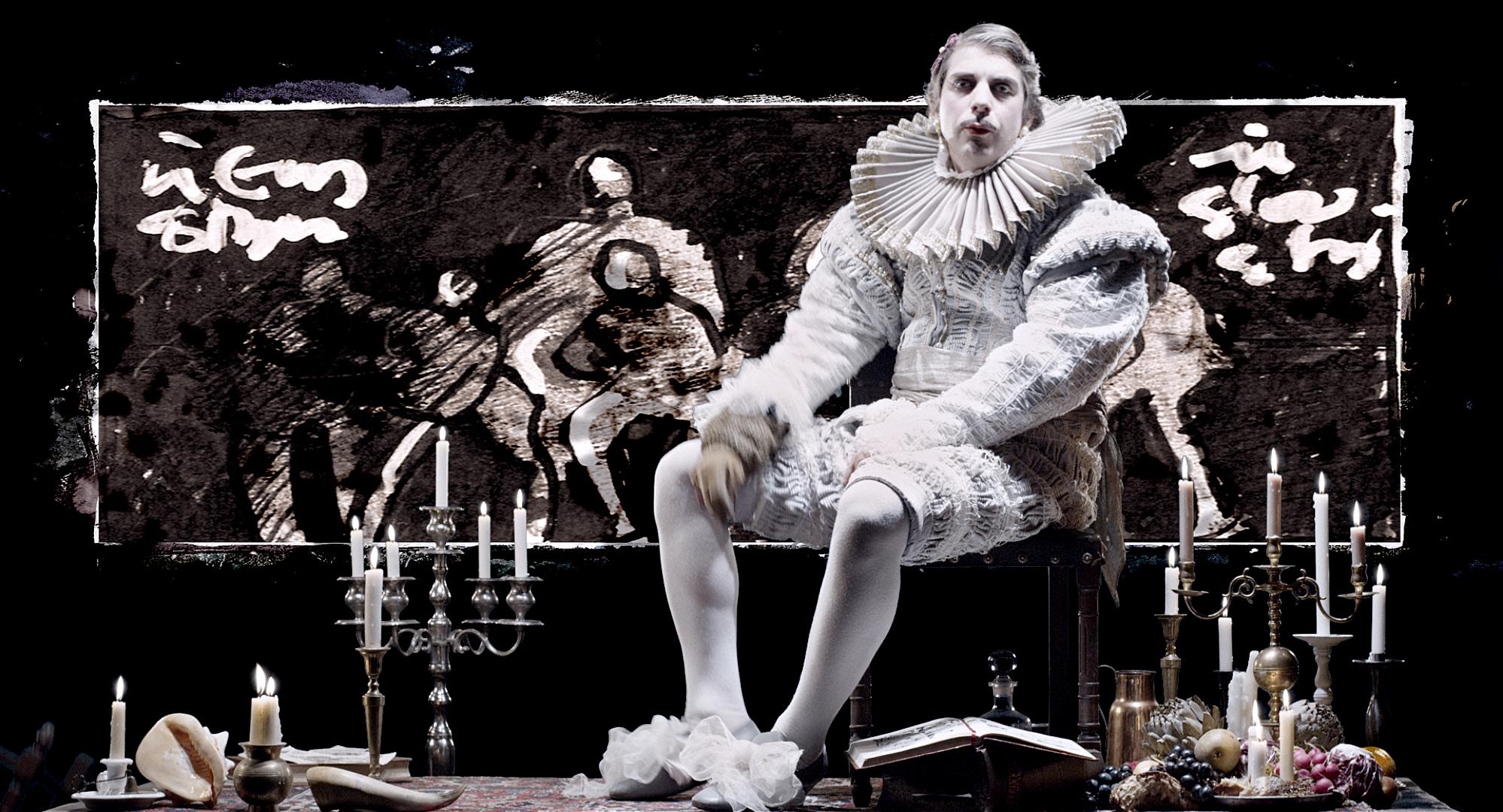Our Sunhi (Hong Sang-soo, South Korea, 2013)
I feel like I should start the same way as last year, when In Another Country was shown at the festival: I still don't get why Hong Sang-soo is shown in the 'Maestro' section. Compared to the other directors in that section, he is young (53), his career has been short (less than twenty years) and he hasn't really won any big prizes. He won the Un Certain Regard at Cannes in 2010 for his very fine HaHaHa, and this one, Our Sunhi, won Best Director at Locarno last year. That seems like his two biggest prizes, and that's not really a lot. It just seems weird to me. He is, however, a true auteur, in that his films are always uniquely his, and always the same. Some of the characters will be film-directors. Everyone will drink an awful lot, especially Soju, traditional Korean drink. And the camera will be steady, pan from time to time to follow the characters, and occasionally zoom a bit. And the lighting will at least seem pretty natural. Also, his films have been called structuralistic, and there will be a lot of repetitions. Often they will take place along the coast - though this one takes place in Seoul. Hong has made six films in the last four years - including another one from 2013, Nobody's Daughter Haewon, which we apparantly won't get to see in Denmark - so there's been plenty of opportunity to learn the rules. Sometime, the films will be very structured, as with the three different visits by Isabelle Huppert, which makes up the plot of In Another Country. Othertimes, the structure will be more lose, as in Woman on the Beach from 2006, probably my favorite of the four I've seen. Apparantly, his cinema has become looser over time, but I'm not qualified to comment on that. I've only seen four out of fifteen movies.
Our Sunhi is one of the looser ones as well. It is structured around a set of meetings between Sunhi and her three paramours: Sunhi and ex-boyfriend Munsu, Munsu and film-maker Jaehak, Sunhi and her professor Donghyun, Donghyun and Jaehak, Sunhi and Jaehak, and finally a variation which I probably shouldn't spoil. Every meeting will evolve into a sit-down, everyone but one involving copious amounts of alcohol, and everyone filmed in one-take. Small things are repeated, such as the same romantic song being played three times, both Munsu and Donghyun standing underneath Jaehak's window and calling up, and three of the meetings involving fried chicken. Also, and crucially, the same language is involved in these conversations, which mostly revolve around defining Sunhi.
The definition of Sunhi is the entire plot of the film: Sunhi has returned to her old film-making school, to procure a recomendation letter from her old professor Donghyun. The film is really, in a smart way, about a young woman trying to get an older man to tell her who she is. Munsu and Jaehak are happy to offer their own opinions as well, Munsu made a film based on his earlier relationship with Sunhi, and Jaehak seems as smitten as the other guys. And the same words are repeated in the descriptions: clever, reserved, brave, artistic sense. What develops is a drunken dance around Sunhi, but as we only hear the same stock phrases about her, she in the end becomes an enigmatic lack in the center. The problem is, obviously, that she only meets lovers or potential lovers, and is only defined by men. She doesn't talk to any other women - except one who only talks about chicken - and she doesn't define who she is herself. As such, it becomes yet another of Hong's examinations of the lopsided ways men and women relate to each other, the same as the rest of his films I've seen, and yet completely new and fresh.
I really, really liked this film. It's funny, insightful, and formalistic in an unobtrusive way. There are beautiful recurring shots of the sun through the autumn leaves, and the use of color on the main characters are really well-done, as can hopefully be glanced from the images. It's another good Hong Sang-soo film, and I can't wait to see what he has for us next year.
Our Sunhi is shown again Tue 4/8, 19:00
Free Range (Veiko Õunpuu, Estonia, 2013)
So after Our Sunhi, there was nothing on the program which was particularly interesting to me. So I decided to go for the one from Estonia. I love Eastern European cinema, but I've never seen an Estonian film before, and the program described it as cinematic 'chillwave', so I didn't really know what to expect. Turned out that, yeah, chillwave seems like an apt description. Like chillwave uses old and wobbly sounds to create a nostalgic and childlike image of the past, so did this film use 16 mm, manufactured 'splices' of mismatched pictures when the reels should connect, and old sounds to create something seemingly older than it is. Instagram was another thing that came to mind, the whole thing looked like the director had spent way too much time on Instagram. Or, with it's preternaturally beautiful young people, old soundtrack filled with Scott Walker and Pearls Before Swine, and beach parties around campfires, it all looked a film by Assayas, like Cold Water or Something in the Air.
Thing is, though, Assayas' nostalgic hipster-films actually takes place in the past. This film decidedly takes place in the present - in one of the first scenes, the main characters is fired from his job as a film-critic after he writes an explicit-filled pan of The Tree of Life, ending with: 'Fagotty God, why did you kill my son?' (quoted from memory). There are two reasons why the atemporality sort of works, though. The obvious one is that the main character lives in the past. The whole film is about him being forced to face the world and his future, as he is fired and finds out his girlfriend is pregnant. He wanted to be an artist, be a boheme, now he has to support a family. The stuntedness of the filmic language mirrors the stuntedness of the main character. However, I find that pretty uninteresting and klichéd, no one needs another film about an emotionally immature manchild. But the second reason is, that it's actually quite interesting how the nostalgia is subverted by the film being from Eastern Europe. When Fred and his friends are dancing to The Smiths and Scott Walker, they are not just mourning a past, they are mourning a past that never were. Towards the end of the film he says: 'Before, everyone lied, and everyone knew it. It was liberating.' This line seems very different, coming from an Estonian, than it would coming from someone from France. The film being Estonian also helps with what I consider one of the greatest klichés of arthouse film-making: The use of Arvo Pärt on the soundtrack. I mean, it's still cheesy to put under a fumbling sex-scene, but still, the composer's Estonian, it's not their fault that the rest of the film-world has driven the use of his music into the ground. And the second time the piece is used, when Fred wanders through town, downtrodden and defeated, the music manages to create a layer of societal decay over the images.
Also, it is quite simply beautiful music.
But in the end, the film cannot escape it's klichés. The biggest problem is a few of the supporting charcters. The girlfriend's parents are so over the top that half of it would still be way too much. And the co-workers Fred meets are unbelievably awful as well. It pretty much sinks a boy-vs-world film, when nothing in the world is portrayed realistically. And as much as the use of 16 mm creates an unusual look, the cinematography is not really strong and personal enough to overcome these issues. Except at the end. My god, the end. Here, the director lets loose with an impressionistic sequence of stunning beauty. The use of the city, the night-lights, and the intercut dream-like images: it's great, and what the entire film should have been. Also, not coincidentally, it's put to modern music, the Salem remixes of I'll Fly Away and Forever Young. This is modern filmmaking, the present repurposing the past, investigating it and reimagining it. If the whole of the film had been this good, it would have been a great film.
It's called Witch-house. Their album King Night is good, although this is apparantly from a mixtape.
Free Range is shown again Tue 4/8, 16:30
Goltzius & the Pelican Company (Peter Greenaway, UK, 2012)
Back when I was a pretentious teenager taking film-classes in high school, Peter Greenaway seemed like my kind of director. Postmodern, rigidly ritualistic, with numbers, riddles and stylised compositions. It seemed smart, and smart was what art should be. Then I saw his films... The Cook, The Thief, His Wife and Her Lover seemed okay, but it didn't seem that smart or rigidly composed. It seemed like typical eighties cinema. Some years later I saw Drowning by Number, the one I had had the highest hopes for, and I was completely underwhelmed. The problem seemed to me, that Greenaway wanted to completely create his own kind of universe, but cinema isn't really that malleable a medium, or perhaps Greenaway just wasn't good enough to form it. It all looked like eighties England, slightely askew. Dull and boring. As his style fell out of vogue, as I decided his powers had probably diminished with age, and as his name seldom came up in the film-press, he became part of the pile of directors I label 'well, someday...'
So colour me surprised: This was a quite good feature, with it's own sense of style that didn't seem like a deadend. It has me intrigued to finally check out the rest of the filmography. But I think digital cinema has been good to Greenaway, the image has become malleable enough. The film is filmed almost entirely in a gigantic factory hall, with ridiculously fake CGI to make it look at times like a dungeon or a meeting hall. Pictures in pictures abound, as an older Goltzius tells his tale of how he procured financing for a printing press from the Margrave of Alsace (F Murray Abraham, unhinged). Symmetrical compositions, mirrors, water and fire, words on screen, and a spinning wooden plate acting like a place for free debate and string concerts. It does not look like England. Effects even make it look at times like an old and parched painting, though the HD-photography remains crisp and hi-def. It is really fun to look at.
The plot is a mess, though. Based on the historical Hendrik Goltzius (1558-1617), who was famous for engraving erotically charged pictures, the story has him and his company acting out the six biblical stories they will later engrave, to amuse their potential benefactor. Stories like the invention of carnal sin, Lot and his daughters, the seduction of Joseph by Potiphar's wife, etc. It's kinda Porn by Numbers. These porn versions obviously stir religious debates at the famously liberal court, and it all becomes a mess of lust, torture, adultery, etc. Now, I've only seen two of Greenaway's films, but this seemed really familiar. The smart, religious men are dealt with in summerical fashion, Torture by Numbers. And the Margrave really seemed like the Thief, complete with sumptuous banquets and grotesqueries. It's all ridiculous, and we've all seen it before. Throw in some stupid accents and a copious amount of un-PC humour - as in keeping with the times, you see - and it does seem quite tired. Also, I don't think it says anything particularly thoughful on free speech, religion, sexual liberation, or anything. But still. The style is strong enough that I would recommend everyone to go see this stupid little curiosity. And I'm going to finally take that plunge through Greenaway's filmography, so that I'm qualified to say something more when his next film, on Hieronymus Bosch, comes out in 2016.
Goltzius and the Pelican Company is shown again Wed 4/9, 19:00 and Mon 4/14, 19:00.
Today I'm going to see Phillippe Garrel's Jealousy, and Sion Sono's Why Don't You Play in Hell. Hope to have something written up on them tonight. And if you made it this far: Thanks for reading, and have a splendid day!






Ingen kommentarer:
Send en kommentar